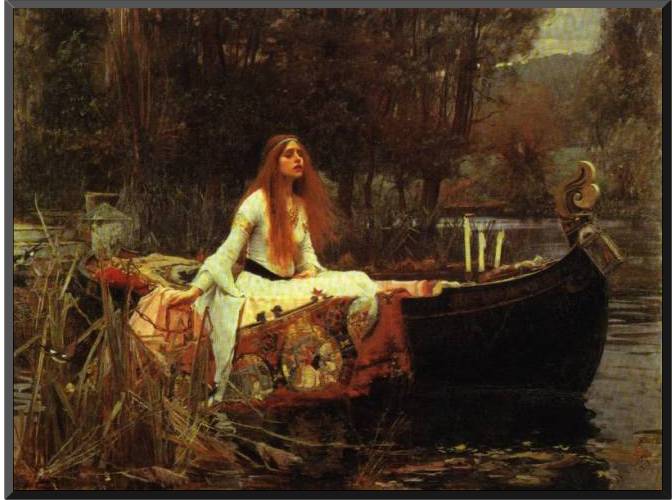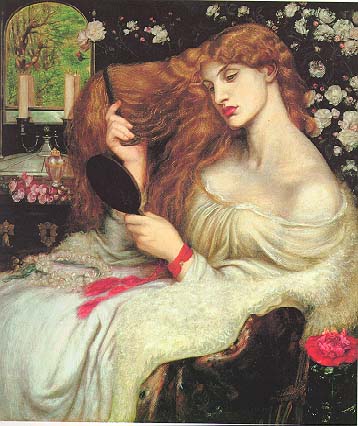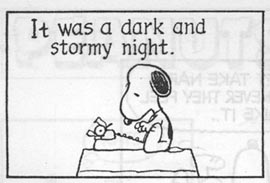
 Portrait
of Lady Audley viewed by Robert and George, pre-Raphaelite (105-7)
Portrait
of Lady Audley viewed by Robert and George, pre-Raphaelite (105-7)-- who were pre-Raphaelites? Dante Gabriel Rossetti, "Lilith"; John William Waterhouse "Lady of Shalott" (right)
What is silenced within discourses -- and what remains unprinted, untaught, and virtually unread within institutions -- is inseparable from what is written and from what remains 'real and remembered' within a canon. -- Tricia Lootens (cited xv in Tromp, et al.)
the previous lack of critical attention does not indicate insignificance, nor can it serve as a continuing justification for her neglect. (xviii, Tromp, et al.)
Page references below, unless otherwise noted, are to Mary Elizabeth Braddon, Lady Audley's Secret, ed. Natalie M. Houston. Peterborough, ON: Broadview Press, 2003.
Beyond Gothic fiction (its emphasis on past, especially its hold on the present; supernatural invasion).
As a challenge to the literary (what is literary?). Begun by Wilkie Collins, The Woman in White (1860).
Its modernity; potential of crime to occur anywhere -- here, bigamy (18). Sensation novels described as "domestic gothic" -- transferring "Gothic events and emotions from exotic and romantic locales into the heart of nineteenth-century Britain" (Nemesvari 516). Cf. Henry Tilney in Northanger Abbey. Implicit claim that the sensation novel is more true to the actual world (Flint 287).
Appearance belies moral status; gender is "performed" (24).
Braddon (1835-1915). Note sensational married history -- used against her. Maxwell's first wife was in a Dublin mental institution (13)
"one of the most noxious books of modern times"
-- North British Review 43 (September 1865): 96
consider literary qualities of following passages (ask: what is narrator doing, what standard of judgement is implied; is characterization appropriate; what perspective is reader supposed to have adopted; view of women)
Appearance of Lady Audley, childlike (90)

 Portrait
of Lady Audley viewed by Robert and George, pre-Raphaelite (105-7)
Portrait
of Lady Audley viewed by Robert and George, pre-Raphaelite (105-7)
-- who were pre-Raphaelites?
Dante Gabriel Rossetti, "Lilith"; John William Waterhouse "Lady
of Shalott" (right)
Peace of countryside, but still a scene for murder (91). Crimes that leave no trace in domestic scene, Robert (170)
Conventional view of women, a pretty woman making tea (242-3); Robert on women (228-230)
Robert's dreams: of Ventnor grave (130); threatened destruction of Audley Hall (263-4)
Lady Audley claims she is mad (354-5)
-- incarcerated at Villebrumeuse, a living grave, confesses attempted murder (396-8)
Convention of sympathetic  weather:
weather:
Spectator (1862). Updates Radcliffean Gothic, makes it modern, with heroine as villain (482). Improbable heroine, however, made out to be mad, but no evidence of it (483); she is merely a monstrosity (484). The novel is in the basement of literary values.
Christian Remembrancer (1863). Sensation novel is evidence of "a craving for some fundamental change in the working of society" (485); it "draws a picture of life which shall make reality insipid and the routine of ordinary existence intolerable to the imagination" (486). Unfits us for prosaic life. A sympathy with crime. Use of bigamy to excite sense of unusual (486). Braddon depreciates custom and steady work of any kind (487). Human nature always in a scrape (488).
H. L. Mansel. Quarterly Review (1863). Sensation novel a purely market phenomenon, no literary immortality (490). Explained as the product of the periodical, the circulating library, and railway bookstall (490).
Henry James, from "Miss Braddon." The Nation, November 1865:
To Mr. Collins belongs the credit of having introduced into fiction those most mysterious of mysteries, the mysteries which are at our own doors.This innovation gave a new impetus to the literature of horrors. It was fatal to the authority of Mrs. Radcliffe and her everlasting castle in the Apennines. What are the Apennines to us, or we to the Apennines? Instead of the terrors of "Udolpho," we were treated to the terrors of the cheerful country house and busy London lodgings. And there is no doubt that these were infinitely the more terrible. Mrs. Radcliffe's mysteries were romances pure and simple; while those of Mr. Wilkie Collins were stern reality. The supernatural, which Mrs. Radcliffe constantly implies, though she generally saves her conscience, at the eleventh hour, by explaining it away, requires a powerful imagination in order to be as exciting as the natural, as Mr. Collins and Miss Braddon, without any imagination at all, know how to manage it. . . . Less delicately terrible, perhaps, than the vagaries of departed spirits, but to the full as interesting, as the modern novel reader understands the word, are the numberless possible forms of human malignity.
We may say, therefore, that Mr. Collins being to Miss Braddon what Richardson is to Miss Austen, we date the novel of domestic mystery from the former lady, for the same reason that we date the novel of domestic tranquillity from the latter. Miss Braddon began by a skilful combination of bigamy, arson, murder, and insanity. These phenomena are all represented in the deeds of Lady Audley. The novelty lay in the heroine being, not a picturesque Italian of the fourteenth century, but an English gentlewoman of the current year, familiar with the use of the railway and the telegraph. The intense probability of the story is constantly reiterated. Modern England -- the England of to-day's newspaper -- crops up at every step. Of course Lady Audley is a nonentity, without a heart, a soul, a reason. But what we may call the small change for these facts -- her eyes, her hair, her mouth, her dresses, her bedroom furniture, her little words and deeds -- are so lavishly bestowed that she successfully maintains a kind of half illusion.
Punch 44 (May 9 1863): 193 (satirical magazine):
This Journal will be devoted chiefly to the following objects; namely, Harrowing the Mind, Making the Flesh Creep, Causing the Hair to Stand on End, Giving Shocks to the Nervous System, Destroying Conventional Moralities, and generally Unfitting the Public for the Prosaic Avocations of Life.
This will culminate in: "A Sensation Novel itself," containing "atrocities hitherto undreamed of, even by the most fashionable fictionists of Paris," written by "an eminent sensation novelist, who will shortly be at liberty under a ticket-of-leave." (cited Hughes 3).
"Contemporary mores and morals may required Braddon to condemn Lucy, but since Braddon's own sense of truth does not, the rhetoric of the book becomes more elaborate than predictable for a work of popular fiction" ( Blodgett 145).
"Moral insanity": as perversion of emotions, undisciplined passions, etc., as defined in 1833; problematic for blurring distinction between madness and criminality, between vice and insanity. Worry over its use in the courts to exonerate murder, etc. (Matus 338). Cf. Bertha in Jane Eyre, daughter of insane mother, etc. -- her "ungovernable appetite, bestiality, and sexuality" (339) -- madness as moral dissolution (340). Note that Lucy's mother becomes mad at the moment she gives birth, "puerperal mania" -- suffered by about 10 percent of women in insane asylums (342). But her disposition after the birth when she is abandoned by her husband, suggests she is mad (angry) rather than mad (insane) (344) -- but defiance of female norms is represented as derangement.
From "Introduction" to Mary Elizabeth Braddon, Aurora Floyd. Ed. Richard Nemsvari and Lisa Surridge. Peterborough, ON: Broadview, 1998:
As Patrick Brantlinger puts it, the "development of the sensation novel marks a crisis in the history of literary realism. At the same time that George Eliot was investing the novel with a new philosophical gravity, the sensationalists were breaking down the conventions of realistic fiction." With its roots in the Gothic romances of the turn of the century and the Newgate crime novel of the 1830s, and its echoes of contemporary stage melodrama, sensation fiction was seen by many as a regression, a degrading step backwards which undermined the hard-earned respectability of the Victorian novel. The kind of romanticism it seemed to encourage ran counter to the serious exploration of society which realism held out as both its justification and its artistic goal.
The sensation novel's detractors claimed that, by pandering to the lowest tastes of its audience, to the desire for physical and emotional titillation, it prevented the appreciation of true fictional artistry by literally creating a "diseased appetite" for improper kinds of writing. Sensation fiction also tended to represent sexual irregularities as being behind the frauds, murders, bigamous marriages and other transgressions which drove its plots.This emphasis on criminal action and illicit passion, rather than on character and motive, was seen to indicate that sensationalists did not deserve a place in the front rank of England's authors. And even more unpleasantly, this low form of writing sold in wildly large numbers.
Blodgett, Harriet. "The Greying of Lady Audley's Secret." Papers on Language & Literature 37 (2001): 132-146.
Flint, Kate. "Sensation Fiction." The Woman Reader, 1837-1914. New York: Oxford University Press, 1993. 274-293.
Hughes, Winifred. The Maniac in the Cellar: Sensation Novels of the 1860s. Princeton, NJ: Princeton University Press, 1980.
Matus, Jill L. "Disclosure as 'Cover-up': The Disclosure of Madness in Lady Audley's Secret." University of Toronto Quarterly 62 (1993): 334-356.
Nemesvari, Richard. "Robert Audley's Secret: Male Homosocial Desire in Lady Audley's Secret." Studies in the Novel 27 (1995): 515-528.
Tromp, Marlene, Pamela K. Gilbert, and Aeron Haynie, Eds. Beyond Sensation: Mary Elizabeth Braddon in Context. Albany: State University of New York Press, 2000.